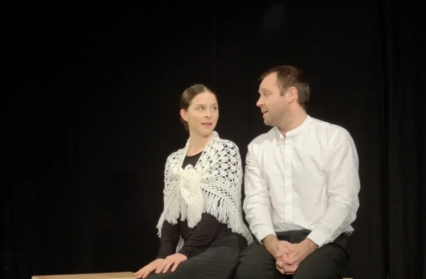Jay Gent reviews the West Wales premiere of Owen Thomas’ West, a play about two Welsh people who fall in love and decide to leave Wales in order to build a new life in the New World.
Wales Arts Review once again finds itself in the intimate surroundings of the Torch Theatre’s studio, where once again we bear witness to the talents of playwright Owen Thomas and actor Gareth J. Bale. Bale is reunited with his Isolationship co-star Gwenllian Higginson for a new production of Thomas’ play West, originally staged pre-COVID for 2019’s North American Festival of Wales and finally making its West Wales debut performance last week.
In much the same way that the Old Masters honed and refined their singular style by painting variations on a theme, Thomas has perfected a genre unique to himself — intimate, first-person tales of unyielding fortitude and indomitable self-determination against all odds from chapel to grave, struck through with spirited Welsh soul — most notably seen in his Welsh sports icon duology Grav and Carwyn (in this context, 2017’s Benny, revisiting the final days of saucy comedian Benny Hill, is something of an outlier, a foray into the much-storied ‘tears of a clown’ micro-genre).
West rolls back an entire century from those aforenamed one-man shows, bringing it all back home to the play’s West Wales setting. This love story charts the life of two of the first intake of Welsh settlers who travelled to America to find new opportunities in the late-nineteenth century. Unlike Thomas’ previous subjects of cultural heroes, Bale and Higginson’s characters are remarkable for their utter ordinariness; we follow the pilgrims’ progress from courtship in their small chapel town on the West Wales coast to braving the cruel sea as they make a transatlantic crossing and building a life of their own in the New World. They are full of wide-eyed innocence, encountering grief and hardship along the way but never losing sight of their humble background and homespun family values of hearth and home. West has an enduring message in these times of regressive attempts to police national borders, freedom of movement restrictions and the current stigmatisation of immigration: that being able to build a better future and seek new horizons is a fundamental human right. For this couple, strangers in a strange land, home is where the heart is.
As with Thomas’ other theatrical works, this production is economically presented but lyrically expansive, its bare bones, Brechtian staging utilising nothing more grand than three wooden plinths rearranged by the two actors with mathematically precise choreography to represent at various times a pulpit, a passenger ship’s deck, a surrey carriage, cliff tops and much more. This means that the dialogue has to do all the heavy lifting to bring the environments the characters pass through to life, and indeed, Bale and Higginson barely take a breath throughout the play’s hour-long run time, voicing not just the Welsh couple but also relatives and strangers alike.
The dialogue paints pictures with words; this is Thomas’ most lyrical work, closer to poetry than mere exposition. West evolves from frequent use of internal rhymes to pure spoken verse, reminiscent of Dylan Thomas’ Under Milk Wood (and shades of James Joyce and TS Eliot’s modernist free verse), imbuing a core of Welshness – this nation is famously a land of song, and Thomas’ rhythmic dialogue is rich in that inimitable salt-of-the-earth Celtic passion and soul, brought to life beautifully by Thomas and Higginson’s lush accents and beautiful delivery. The play also has a pleasingly circular feel, complete with later scenes calling back and mirroring earlier ones – this is most notable when Higginson’s innocent character is stalked by a creep in Chicago in a seedy, sinister inversion of her romantic and playful first meeting with her future husband at the front end of the play.
Another aspect of Owen’s formidable script is the evocative use of personification of nature and the elements through the characters’ rhapsodic dialogue. Memorable examples of this include summer ‘putting its clothes on’ and the light in the room ‘leaving through the keyhole and sneaking down the stairs and out the door’ as Bale’s character’s grandfather passes away on his deathbed.
On the basis of this play’s writing, Thomas should consider himself entitled to add to his well-earned professional title of playwright that of poet. In a way, West feels like a musical without a score: the actors’ movements are choreographed throughout, as precisely as a musical production, and it’s not a huge stretch to picture the show being brought to life as a fully-fledged piece of musical theatre. Who knows, maybe a future iteration of this production could do for Pembrokeshire’s pilgrims what Hamilton has done for the New World’s founding fathers.
Read Jay Gent’s review of Owen Thomas’ Carwyn here.












